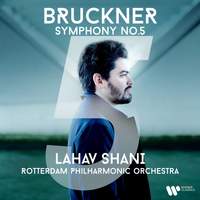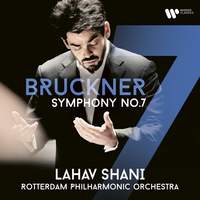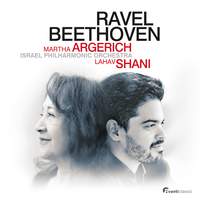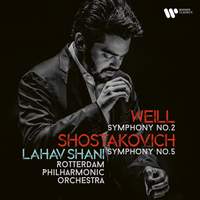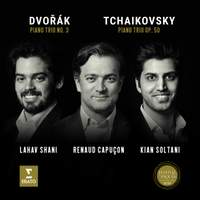Interview,
Lahav Shani on Prokofiev, Bruckner and Rotterdam
We spoke last week about how he maintains his dual career as pianist and conductor, the inspiration which he draws from his friendships with Martha Argerich (with whom he recorded piano concertos by Beethoven and Ravel in 2019) and Daniel Barenboim, his ever-evolving approach to Bruckner - and why he knew that his relationship with the Rotterdam Philharmonic was destined for the long haul from the first few minutes of rehearsal together...
Am I right in thinking this is your first visit to the Proms?
As a performer, yes! This concert was supposed to happen four years ago, but was postponed because of the pandemic. I’m very much looking forward to finally making this debut, and to do so with the Rotterdam Philharmonic in Prokofiev’s Piano Concerto No. 3 is particularly special: we’ve performed it so many times together now that I really think of it as ‘our piece’.
There’s a recording of it on YouTube which we made in 2021, and because of the regulations on social distancing we experimented with seating arrangements. I put the woodwinds in a very unusual place on my right: between the piano and the public, facing me but with their backs to the audience. They were sitting so far away from each other as it was, and if they’d been in their usual position they wouldn’t have been able to hear the piano at all. The players loved it: they could hear the strings far more clearly than they ordinarily would, and a lot of them said it was like experiencing the piece for the first time!
Was it always your plan to sustain a dual career as pianist and conductor?
Yes and no! After winning the Mahler Competition in 2013 it was clear that conducting was going to be the main thing in my career, but my passion for music-making goes beyond that: I knew that I didn’t want to stop playing the piano, and that I wanted to combine the two as much as I could. Maintaining a routine is basically impossible for me and that’s why I only play occasionally - whether that’s play-conducting, playing concertos with other conductors or doing chamber music.
I don’t play the piano every week or even every month – I’m just happy I can do it at all. Playing any instrument is very different from conducting, where you can take a break for a couple of months without worrying that you’ll get out of shape on a physical level: your mind has to be in shape, but your body not so much!
I don't think I've ever heard anyone direct a twentieth-century piano concerto from the keyboard - is there much precedent for that?
Play-conducting any of the Prokofiev concertos is very rare. Dimitri Mitropoulos famously stepped in for a performance of No. 3 with the Berliner Philharmoniker in 1930 when his soloist fell ill, and later recorded it for Columbia. At the time the piece wasn’t well known, and there was no recording to use as a reference-point - he really had to learn it from scratch and conduct at the same time. As far as I know, the only other great artist who attempted it was Van Cliburn: he wasn’t really a conductor, but he directed the piece from the piano for an educational project.
How challenging is it from a physical point of view?
Not at all: it took me a couple of concerts to feel comfortable, but it feels very natural now. Honestly, the main challenge is remembering that you’re not just conducting and need to play the piano in a few bars’ time! But it does involve a different kind of concentration on the physical level, which you don’t have to the same extent as a conductor: you need to be mindful of how you’re sitting at the instrument in order to switch between the two roles effectively, and of course be thinking ahead to what you need to do with your fingers…
Musically it’s extremely rewarding and a lot of fun. As a conductor I’m so used to listening and anticipating what the orchestra is about to do (both in rehearsal and performance), but in this kind of scenario the players know that they have to take a lot of initiative and think like a conductor rather than just following. I think that’s the best way to make music with an orchestra in any case – it’s like chamber music on a larger scale. I encourage the players to think of themselves as co-initiators, and absolutely trust them to work with me rather than for me.
Is play-conducting something you do every season?
I only do it occasionally, because I love collaborating with other soloists: getting inspired by them, learning from them, and hopefully giving something of my own to them. The reason I became a conductor rather than continuing as a solo pianist was that I always wanted to make music with other people – whether I’m sharing a stage with a whole orchestra or just one partner in chamber music, it’s always such a joy to communicate with other musicians.
I do give solo piano recitals, but only rarely: every two years or so I’ll come up with a recital programme because there’s so much repertoire that I want to explore, but I wouldn’t do it for most of the year because I much prefer being sociable!

One of your great supporters, Daniel Barenboim, has of course maintained an illustrious parallel career in both capacities too...how did he come into your life?
We met in Berlin, when I came to study here in 2010. Shortly after I moved here, a friend of mine did an audition for him for the West-Eastern Divan Orchestra and I went along as accompanist. Daniel had heard a bit about me through other musicians, and he struck up a conversation with me straight away: he said I was always welcome to come along to his rehearsals and to contact him directly if I ever had any questions to ask.
Of course I took him up on the offer; I learned so much from him, and as the years went by we became very close friends. He played as a soloist with me on a few occasions, including for my debut as Chief Conductor of the Rotterdam Philharmonic. This wonderful collaboration all started from him being very generous to a young musician he knew very little about, and had met purely by chance: he saw and heard something in me, and I’m forever grateful to him for trusting his instincts.
On the subject of wonderful collaborations, what's the story behind your friendship with Martha Argerich?
Martha and I have had an extraordinary chemistry right from the beginning, and we trust one another entirely on stage. Sometimes we’ll look at each other at the end of a concert and it’s as if we’ve been sharing the same mind for the last half-hour; we don’t even talk very much in rehearsals, because we simply don’t need to.
Martha is a totally free and spontaneous musician, liberated from any sort of rules. It’s sometimes difficult for her to make decisions in advance - which can be tricky in everyday life, but in music it’s wonderful! It isn’t that her playing is in any way chaotic: it’s completely logical, but at the same time it’s improvisatory and absolutely in the moment. That’s exactly the kind of music-making I adore and aspire to do myself. Whenever we play piano four hands or do a concerto together I feel she’s able to do anything she wants, and somehow I always know where she’s going…Maybe it’s something to do with the fact that I grew up on her recordings!
Your father [Michael Shani] is also a conductor - how active a role did he play in your early musical education?
He brought me into this world, literally and in many other ways. I went to countless rehearsals when I was a baby, so Dad was the first conductor I ever saw. He also had a huge library of video-cassettes at home: to this day he prepares and delivers a lot of wonderful lectures about music, and he had all sorts of operas and concerts in his collection as material. I grew up in the 1990s, which was the golden age of Disney; The Lion King and Aladdin had just come out, so I would watch those and other Disney classics with my friends and when it was over I’d move onto The Magic Flute or Lieutenant Kijé! I didn’t think that was anything out of the ordinary: it was all just available to me, so I’d watch something every single day.
Once I was a bit older my dad taught me a lot about conducting and music theory: I have a vivid memory of him driving us to France and explaining the basic principles of harmony to me along the way! He was my main music teacher, alongside my wonderful piano teacher Hanna Shalgi who taught me for eleven years. He still runs his choir and lectures, and he comes to all my concerts in Israel.
You've spent a lot of time exploring Bruckner with the Rotterdam Philharmonic, including recordings of Symphonies No. 5 and 7 - was he a composer who intrigued you from childhood?
He’s definitely not a composer I knew well as a young person, but after I moved to Berlin I started listening to all the recordings I could get my hands on: Barenboim of course, and also Furtwängler, Karajan, Wand, Abbado, Jochum…there’s even one Bernstein recording of the Ninth, which I’m very fond of. More recently I’ve found Thielemann and Iván Fischer very different and interesting in their own ways.
All of those people inspired me to form my own perception of how I think the orchestra should play this type of music…I say ‘this type of music’, but really Bruckner is a type all on his own! No. 5 was the first Bruckner symphony I conducted, on the recommendation of a friend. Everybody knows Nos. 4 and 7, but No. 5 is highly complex and initially I wondered if it was the right place to start…But I immediately felt right at home with the sound: I loved the harmonic language and that wonderful cantabile second movement, and hopefully I’ll continue developing my Bruckner style for many years to come.
I don’t try to conduct Bruckner like anybody else: the main thing that guides me in terms of the sound-world is that we know that he imagined a very generous resonance for his music, like a church or the Musikverein (which is not all that far away from a church acoustic anyway). Whenever Bruckner writes a staccato or staccatissimo of course it should be observed, but I think the sound should also have a tail like it would in a church. It’s more about the articulation than the length of the notes, and for me that makes a lot of sense because otherwise it gets extremely dry and all over the place. But otherwise I find it very natural – it’s a joy to perform this music.
The Rotterdam Philharmonic offered you the position of Chief Conductor on the basis of a single engagement, back in 2016 - did you realise something special was happening during those rehearsals?
I think the feeling was mutual. As soon as I started conducting Tchaikovsky 6 in our first rehearsal, I thought ‘I’ve found my place!’. I remember the open faces of the musicians so vividly, and the gorgeous sound that we achieved together from the off. I was in talks with several other orchestras at the time, but somehow Rotterdam and I clicked right away.
I felt that the players were very curious and willing to do things in a different way. They’d done Tchaikovsky 6 with all their Guest Conductors and Chief Conductors - but when this newcomer came along and asked for certain things, they responded not just with respect but with real joy and enthusiasm. I knew then that I really wanted to stay. I called my wife in the first break, full of excitement, and she said ‘Well Lahav, it’s early days...maybe you should lower your expectations!’ Anyway, after the first concert they asked me to be their Chief Conductor and here we are!
Lahav Shani makes his BBC Proms debut with the Rotterdam Philharmonic on Friday 23rd August. The Rotterdam Philharmonic (with Lahav Shani) records exclusively for Warner Classics – their recordings of Bruckner’s Symphony No. 5 and Symphony No. 7 are available below.
Rotterdam Philharmonic Orchestra, Lahav Shani
Available Formats: CD, MP3, FLAC/ALAC/WAV, Hi-Res FLAC/ALAC/WAV, Hi-Res+ FLAC/ALAC/WAV
Rotterdam Philharmonic Orchestra, Lahav Shani
Available Formats: CD, MP3, FLAC/ALAC/WAV, Hi-Res FLAC/ALAC/WAV, Hi-Res+ FLAC/ALAC/WAV
Martha Argerich (piano), Israel Philharmonic Orchestra, Lahav Shani
Available Formats: CD, MP3, FLAC/ALAC/WAV, Hi-Res FLAC/ALAC/WAV
Rotterdam Philharmonic Orchestra, Lahav Shani
Available Formats: CD, MP3, FLAC/ALAC/WAV, Hi-Res FLAC/ALAC/WAV
Renaud Capuçon (violin), Lahav Shani (piano) & Kian Soltani (cello)
Available Formats: MP3, FLAC/ALAC/WAV, Hi-Res FLAC/ALAC/WAV



